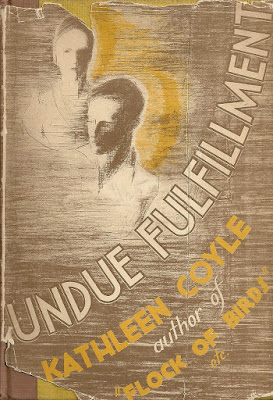 |
| New York : William Morrow & Co., 1934 |
"It is not a crime to be a poet."
"No ... it places one on a plane where crime is so sublimated that it has another name."
In the vein of Birabeau's Revelation (1930), Undue Fulfillment is focused on a mother dealing with her son's relationship with another man. Although in this instance we hear from the son, the primary focus of the action is on the mother and her thoughts and feelings about her adult son's life and whether she has been successful at raising him.
Agatha's late husband served in World War I and having struggled since his years of service committed suicide while their son Lawrence was still young. As Lawrence grew up, Agatha held him close—too close she decided. For fear that he would not be able to disengage from his relationship with his mother enough to find a wife, Agatha returns to the convent in Ireland where she grew up, leaving Lawrence their home in Paris.
Upon hearing that Lawrence's relationship with Lena has ended, Agatha travels to Paris in hopes of bringing the two back together. Upon meeting with Lena, Agatha learns the reason for the split—Lawrence's new close relationship with Cesar Brak, a poet from Lawrence's parent's generation. While the relationship is not labeled as gay or homosexual, it is clear from what is said (and what is not said) that the relationship is sexual.
Structured around Agatha's connection to the convent and her brother Owen being a monk, there is a strong religious morality to the story. Lawrence's father who committed suicide was named Judas and appears to serve as a symbol of betrayal of his wife and child. This is juxtaposed with Cesar Brak and his generation having served in the war which was so devastating that it is hard to reconcile with the existence of any god. This is a philosophical novel about the nature of motherhood and how we reconcile our spiritual life with the challenges of being human in an ugly world.
* Also published under the title Undue Fulfilment by Ivor Nicholson & Watson Ltd., London (1935).
Bibliographies & Ratings: Cory (IV); Garde (P 50 *); Mattachine Review (IV); Young (839)